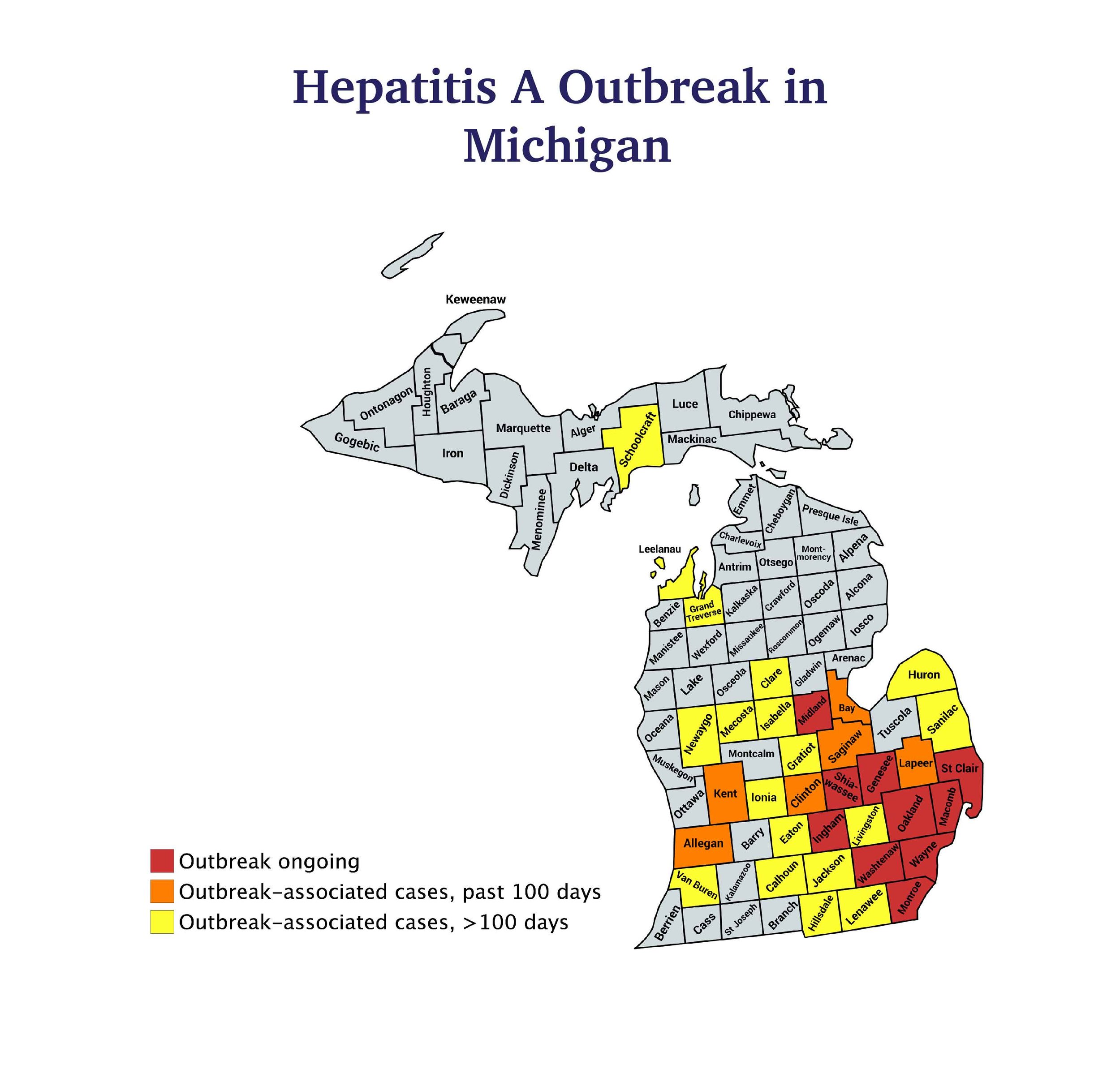Michigan is currently experiencing the worst outbreak of hepatitis A virus (HAV) in the country, and Michiganders should get vaccinated against HAV.
What is hepatitis A?
Hepatitis A is one of the many forms of viral hepatitis, a disease characterized by inflammation of the liver caused by viral infections. HAV is transmitted from person-to-person by exposure to infected fecal matter. Eating contaminated food or beverage (for instance, a sick employee doesn’t wash their hands before preparing your meal) is the most common route of transmission although people can also become infected after close contact or sexual intercourse with an infected individual. Unlike hepatitis B or C, HAV does not cause chronic infection that can lead to liver cirrhosis (scarring) and/or liver cancer. However, that does not mean HAV is harmless.
Symptoms of hepatitis A include:
- Nausea and vomiting
- Belly pain
- Fever
- Loss of appetite
- Tired feeling
- Yellowing of the skin and eyes (called jaundice)
- Dark urine
- Clay-colored feces
- Joint pain
While not everyone infected with HAV becomes sick, symptoms usually appear within 15-50 days after exposure and can last for several weeks. In rare cases, HAV can be fatal. Your risk for serious illness from HAV increases dramatically if you have chronic liver disease such as caused by hep B, hep C, alcohol use, or obesity.
Is hepatitis A curable? Since it is a virus, and therefore not technically alive, HAV cannot be cured with antibiotics like bacteria infections can. While there are some antiviral medications available, none treat HAV specifically. Once infected, it is up to your body’s immune system to clear the infection on its own. Your best bet is to prevent HAV infection in the first place.
Hepatitis A outbreak in Michigan
Since 2016, an outbreak of HAV has been underway in Michigan. Ten counties in southeast and mid Michigan have ongoing transmission of the virus and people from an additional twenty-three counties have become sick (likely from contact with food or an infected person from the outbreak jurisdiction). At least 856 people have gotten sick since August 2016, 80.8 percent of the sick have needed to be hospitalized and 27 people have died.
Unlike another recent HAV outbreak in San Diego, the Michigan outbreak has shown no signs of slowing down. In fact, public health experts at CDC project that this outbreak will last for at least another year. With new cases usually spiking in the summer, Michiganders, especially those living in the impacted counties and those with high risk for infection, should consider vaccination.
Who should get vaccinated for Hepatitis A?
While most children are now vaccinated against HAV, most adults are not. The Michigan Department of Health and Human Services recommends the following populations get vaccinated because they are at higher risk for HAV infection or for serious complications should they get infected:
- People who are homeless
- People who are in prison
- People who use illegal drugs (either injection or non-injection)
- People who live with or have close contact with someone with HAV
- People who have sexual activities with partners who have HAV
- Men who have sex with men
- Travelers to countries with mid-to-high risk for HAV (check here)
- People with chronic liver disease (such as chronic hepatitis B/C infection or alcoholic/non-alcoholic fatty liver disease)
- People with clotting disorders
The hepatitis A vaccination consists of a series of two shots, however, even getting one shot can have preventative benefits. Click here to read more about the vaccine. Because of the Affordable Care Act, your vaccine will be covered by your insurance. Don’t have insurance? Many local health departments, including the Washtenaw County Health Department, have received grants to give vaccinations to high-risk individuals free of charge!










